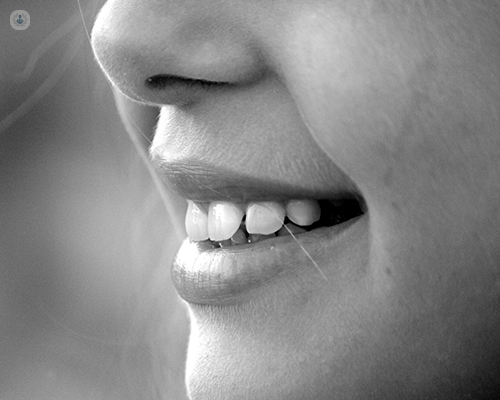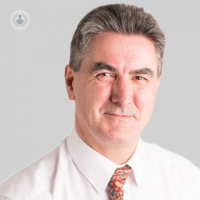How do dental implants work?
Written by:When you lose a tooth, there are several options to restore normal function, comfort, and aesthetics in the mouth, getting your smile back to normal. Dental implants are a popular choice for those who wish to have a missing tooth, or in fact several teeth replaced. Professor Andrew Sidebottom, consultant oral and maxillofacial surgeon, explains who implants may be suitable for, and why you might wish to consider having an implant fitted.

What are dental implants?
A dental implant is a way of replacing missing teeth or a single tooth. Effectively it is like a rawl plug in the bone. This allows the dentist to place a post into it, and then crown and bridgework or dentures onto the implant. This is then secured into the bone. It can be used to support a crown or bridge, or it can be used to stabilise a denture.
Many people aren’t interested in dentures as they may not be practical in some ways. For example, removable dentures move around, they’re not very effective for eating, and food can get stuck under them. People often want to feel confident when they eat in public, and they also want to be able to smile without showing any missing teeth. Implants give us a way of doing this. They allow us to provide a fixed replacement for your original teeth.
How are implants fitted?
The process of having dental implant treatment starts with a very careful assessment of the patient’s needs and whether implant treatment is appropriate for them. The assessment looks at how much bone there is, and how much gum is shown when they smile. We then move on to the phase involving the placement of the implants.
If you require a failing tooth to be extracted, this can either be immediately replaced with an implant if there is no infection present. More usually a delay of 2-3 months is needed to allow the bone to heal and a temporary denture may be suggested to maintain aesthetics.
Sometimes the dentist or specialist can put teeth immediately onto the fixtures but more commonly, there is a waiting period of about two to three months before building those final teeth on top, which may come in the form of single crowns, bridgework, or removable dentures that are stabilised by the implants so that they are comfortable for the patient to use. This waiting period allows the implant to fix itself into the bone and provides better long-term success.
Are implants suitable for me?
Implants are suitable for most people. There is often the worry that implants cannot be fitted because of more advanced age, but even people in their 90s have had implants successfully fitted, which significantly contributes to the quality of life at that stage.
The biggest problems encountered are often people who have uncontrolled gum disease. In this case, they must team up with a hygienist, or gum specialist, to make sure that the mouth is as healthy as possible before an implant is fitted, and that the patient maintains good hygiene practice.
Smokers may also encounter problems with having implants fitted and keeping them in good condition. To help implants last longer and keep them looking healthy, it is imperative that smoking is under control, or the habit is given up altogether. If you need help to give up smoking, your GP or a healthcare professional can help with advice and support.
What are the alternatives?
Your dentist or specialist will discuss the alternatives which include leaving the gap, a denture or a bridge. They will discuss the advantages and disadvantages of each of these treatment options so you can make an informed decision on the best course of action.
Will the implant last for life?
Dental implants are a long-term solution to restoring gaps in your mouth. With good care in association with a Dental hygienist, they will last many years. The crowns, bridges and dentures on top of them may however need to be repaired or replaced periodically, although this does not mean the implant itself needs to be replaced.
Professor Andrew Sidebottom is a renowned consultant consultant oral and maxillofacial surgeon based in Nottingham. If you would like to book a consultation with Professor Sidebottom, you can do so today via his Top Doctors profile.


